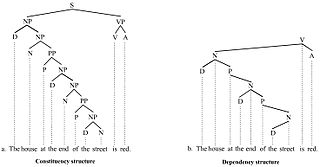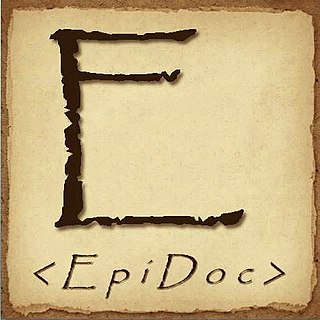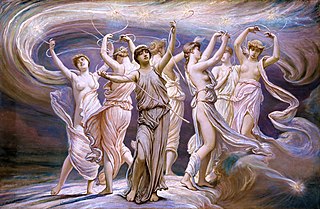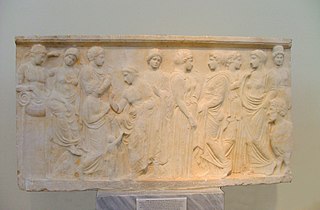
Alpheus or Alpheios, was in Greek mythology a river and river god.

In Greek mythology, Alcyone and Ceyx were a wife and husband who incurred the wrath of the god Zeus for their romantic hubris.

In Greek mythology, an Oread or Orestiad is a mountain nymph. Oreads differ from each other according to their dwelling: the Idaeae were from Mount Ida, Peliades from Mount Pelion, etc. Myths associated the Oreads with Artemis, since the goddess, when she went out hunting, preferred mountains and rocky precipices.
In Greek mythology, the name Halaesus or Halesus may refer to:
In Roman mythology, the Aeneads were the friends, family and companions of Aeneas, with whom they fled from Troy after the Trojan War. Aenides was another patronymic from Aeneas, which is applied by Gaius Valerius Flaccus to the inhabitants of Cyzicus, whose town was believed to have been founded by Cyzicus, the son of Aeneas and Aenete. Similarly, Aeneades was a patronymic from Aeneas, and applied as a surname to those who were believed to have been descended from him, such as Ascanius, Augustus, and the Romans in general.
The Perseus Digital Library, formerly known as the Perseus Project, is a free-access digital library founded by Gregory Crane in 1987 and hosted by the Department of Classical Studies of Tufts University. One of the pioneers of digital libraries, its self-proclaimed mission is to make the full record of humanity available to everyone. While originally focused on the ancient Greco-Roman world, it has since diversified and offers materials in Arabic, Germanic, English Renaissance literature, 19th century American documents and Italian poetry in Latin, and has sprouted several child projects and international cooperation. The current version, Perseus 4.0, is also known as the Perseus Hopper, and is mirrored by the University of Chicago.

In Greek mythology, Hesperus is the Evening Star, the planet Venus in the evening. He is one of the Astra Planeta. A son of the dawn goddess Eos, he is the half-brother of her other son, Phosphorus. Hesperus' Roman equivalent is Vesper. By one account, Hesperus' father was Cephalus, a mortal, while Phosphorus was the star god Astraios. Other sources, however, state that Hesperus was the brother of Atlas, and thus the son of Iapetus.

A Greek–English Lexicon, often referred to as Liddell & Scott or Liddell–Scott–Jones (LSJ), is a standard lexicographical work of the Ancient Greek language originally edited by Henry George Liddell, Robert Scott, Henry Stuart Jones, and Roderick McKenzie and published in 1843 by the Oxford University Press.

In linguistics, a treebank is a parsed text corpus that annotates syntactic or semantic sentence structure. The construction of parsed corpora in the early 1990s revolutionized computational linguistics, which benefitted from large-scale empirical data.

EpiDoc is an international community that produces guidelines and tools for encoding in TEI XML scholarly and educational editions of ancient documents, especially inscriptions and papyri.

Alcyone, in Greek mythology, was the name of one of the Pleiades, daughters of Atlas and Pleione or, more rarely, Aethra. She attracted the attention of the god Poseidon and bore him several children, variously named in the sources: Hyrieus, Hyperenor, and Aethusa; Hyperes and Anthas; and Epopeus. By a mortal, Anthedon, Alcyone became the mother of the fisherman Glaucus, who was later transformed into a marine god.
Digital classics is the application of the tools of digital humanities to the field of classics, or more broadly to the study of the ancient world.
Linguistic categories include
Grammatical Framework (GF) is a programming language for writing grammars of natural languages. GF is capable of parsing and generating texts in several languages simultaneously while working from a language-independent representation of meaning. Grammars written in GF can be compiled into a platform independent format and then used from different programming languages including C and Java, C#, Python and Haskell. A companion to GF is the GF Resource Grammar Library, a reusable library for dealing with the morphology and syntax of a growing number of natural languages.

The Quranic Arabic Corpus is an annotated linguistic resource consisting of 77,430 words of Quranic Arabic. The project aims to provide morphological and syntactic annotations for researchers wanting to study the language of the Quran.
Pegasides were nymphs of Greek mythology connected with wells and springs, specifically those that the mythical horse Pegasus created by striking the ground with his hooves.

Cephissus commonly spelled Kephissos or Kifisos is a river god of ancient Greece, associated with the river Cephissus in Attica and/or with the river Cephissus in Boeotia, both in Greece.

In Greek mythology, Aganippe was the name of both a spring and the Naiad associated with it. The spring is in Boeotia, near Thespiae, at the base of Mount Helicon, and was associated with the Muses who were sometimes called Aganippides. Drinking from her well, it was considered to be a source of poetic inspiration. The nymph is called a daughter of the river-god Permessus. Ovid associates Aganippe with Hippocrene.
In Greek mythology Smilax was the name of a nymph who was in love with Crocus and was turned into the plant bearing her name. Ancient sources with information about her and her tale are few and far in between.









